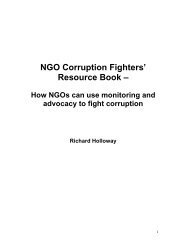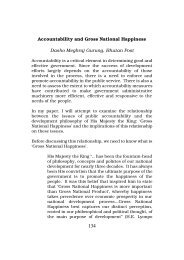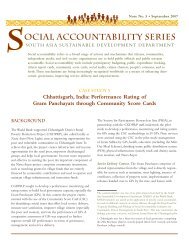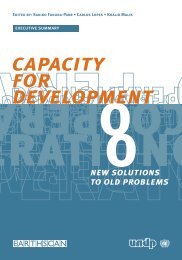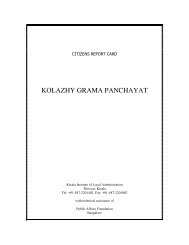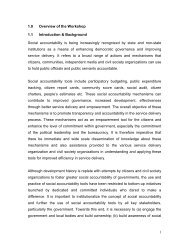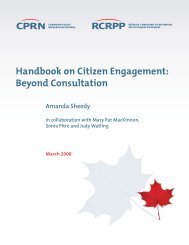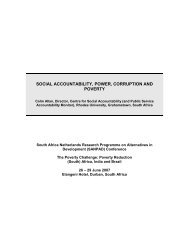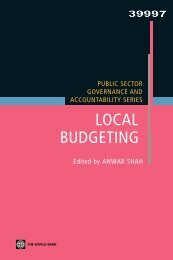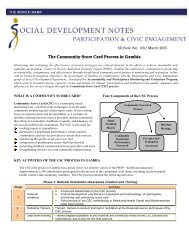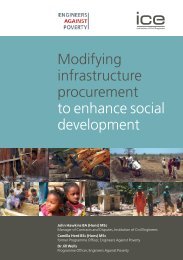Enabling Environment for Social Accountability in ... - SASANet
Enabling Environment for Social Accountability in ... - SASANet
Enabling Environment for Social Accountability in ... - SASANet
You also want an ePaper? Increase the reach of your titles
YUMPU automatically turns print PDFs into web optimized ePapers that Google loves.
Executive Summary<br />
Governmental accountability has become an <strong>in</strong>creas<strong>in</strong>g focus of attention by the World Bank and other<br />
<strong>in</strong>ternational donors <strong>in</strong> their development policies, strategies, and programs. Ef<strong>for</strong>ts to promote<br />
accountability have traditionally focused on improv<strong>in</strong>g horizontal accountability between governmental<br />
actors and <strong>in</strong>stitutions, that is, the “supply-side” of governance. Recently, however, the “demand side” of<br />
governance, <strong>in</strong>clud<strong>in</strong>g but not limited to the electoral process, has received greater attention. This vertical<br />
<strong>for</strong>m of social accountability is based on civic engagement as a means to promote transparency and<br />
responsiveness <strong>in</strong> public policy mak<strong>in</strong>g and implementation and is <strong>in</strong>creas<strong>in</strong>gly regarded as vital <strong>for</strong> good<br />
governance. Moreover, social accountability empowers citizens, especially poor citizens, and promotes<br />
<strong>in</strong>clusive and accountable <strong>in</strong>stitutions that can enhance the political legitimacy and stability of a<br />
government and strengthen social cohesion.<br />
<strong>Social</strong> accountability refers to a range of mechanisms that citizens can use to hold public officials to<br />
account, and actions on the part of government, civil society, media, and other societal actors that<br />
promote these ef<strong>for</strong>ts. 1 While conventional ways of hold<strong>in</strong>g governments accountable have <strong>in</strong>cluded such<br />
actions as public protests, advocacy campaigns, and <strong>in</strong>vestigative journalism, there is grow<strong>in</strong>g attention to<br />
social accountability practices such as participatory budget<strong>in</strong>g, public expenditure track<strong>in</strong>g, and citizen<br />
monitor<strong>in</strong>g of public service delivery, which emphasize a solid evidence base and direct negotiation<br />
between citizens and government representatives.<br />
The role of civil society actors <strong>in</strong> promot<strong>in</strong>g social accountability is particularly relevant to Mongolia<br />
because of the emphasis the Government of Mongolia (GoM) and its development partners place on good<br />
governance to enhance social and economic development. <strong>Social</strong> accountability mechanisms that<br />
strengthen l<strong>in</strong>ks between the state and citizens <strong>for</strong>m a critical foundation <strong>for</strong> Mongolia’s ongo<strong>in</strong>g ef<strong>for</strong>t to<br />
develop democratic <strong>in</strong>stitutions that enable economic growth and human development. These mechanisms<br />
are important <strong>for</strong> limit<strong>in</strong>g corruption, a problem all stakeholders acknowledge as a mount<strong>in</strong>g challenge <strong>in</strong><br />
Mongolia. Given the sociopolitical legacies of the socialist regime that re<strong>in</strong><strong>for</strong>ce top-down approaches to<br />
governance, one of the greatest challenges to achiev<strong>in</strong>g Mongolia’s economic and social development is<br />
enhanc<strong>in</strong>g the important role that citizens and their organizations can play <strong>in</strong> promot<strong>in</strong>g government<br />
accountability.<br />
The purpose of this study, there<strong>for</strong>e, is: 1) to analyze conditions that <strong>in</strong>fluence the ability of citizens and<br />
their organizations to promote accountability of public <strong>in</strong>stitutions <strong>in</strong> Mongolia; 2) to identify priority<br />
areas <strong>for</strong> policy, legal, regulatory, and <strong>in</strong>stitutional re<strong>for</strong>ms to improve these conditions; and 3) to identify<br />
areas <strong>in</strong> which the capacity build<strong>in</strong>g of civil society organizations and the Government of Mongolia may<br />
be promoted to enhance social accountability <strong>for</strong> improved governance, social and economic<br />
development, and poverty reduction.<br />
Despite numerous studies on related topics of governance, development, and civil society <strong>in</strong> Mongolia,<br />
many of which are cited <strong>in</strong> this document, few have considered and none have focused on issues related<br />
to social accountability. 2 The study applies a civic engagement analytical framework to assess the<br />
enabl<strong>in</strong>g environment: the factors and conditions that would allow CSOs to promote public<br />
accountability. This framework, represented by the acronym ARVIN, recognizes five enabl<strong>in</strong>g elements<br />
1 Although the focus of this paper is public sector accountability, social accountability also applies to society’s actions <strong>in</strong> exact<strong>in</strong>g<br />
accountability from private sector <strong>in</strong>stitutions and even CSOs.<br />
2 A notable exception is the recent World Bank study on Mongolian Civil Society Organizations by Chris F<strong>in</strong>ch (2005), which<br />
provides critical background <strong>in</strong><strong>for</strong>mation to this document.



